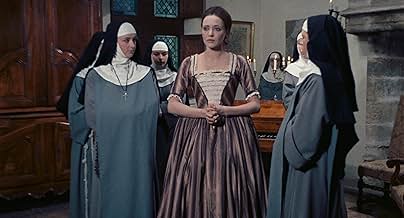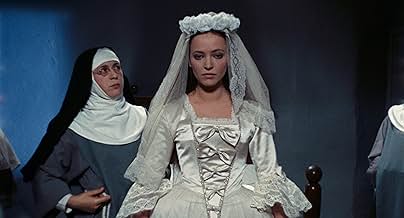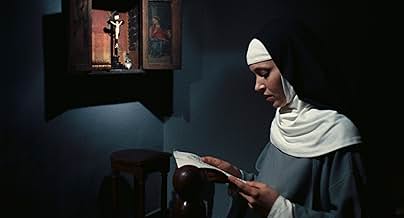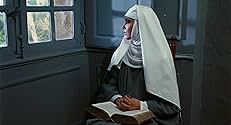Suzanne is forced against her will to take vows as a nun and three mothers superior treat her in radically different ways. Suzanne's virtue brings disaster to everyone in this faithful adapt... Read allSuzanne is forced against her will to take vows as a nun and three mothers superior treat her in radically different ways. Suzanne's virtue brings disaster to everyone in this faithful adaptation of a bitter attack on religious abuses.Suzanne is forced against her will to take vows as a nun and three mothers superior treat her in radically different ways. Suzanne's virtue brings disaster to everyone in this faithful adaptation of a bitter attack on religious abuses.
- Director
- Writers
- Stars
- Awards
- 2 nominations total
- Director
- Writers
- All cast & crew
- Production, box office & more at IMDbPro
Featured reviews
The film follows the unhappy Suzanne's life as a nun. It falls into three sections, corresponding to the three Mothers Superior under whom she serves. The first, Madame de Moni, is a kindly woman who knows that Suzanne has only entered into the religious life with great reluctance and does her best to make the girl's life bearable. When de Moni dies, however, the new Mother Superior, the fanatical and puritanical Sister Sainte-Christine takes a dislike to Suzanne, whom she sees as rebellious, treating her harshly, whipping her, putting her on a diet of bread and water, and forbidding the other nuns to have anything to do with her. (Sainte-Christine is also referred to by her family name, Madame de Tourmont, a name probably chosen because of its similarity to "tourment", French for "torment").
With the assistance of a sympathetic lawyer, Suzanne asks to be released from her vows, on the grounds that she was forced to become a nun against her will. This application is unsuccessful, but at least she is transferred to another convent. Sainte-Christine is reprimanded by the Bishop for her treatment of Suzanne, but is not otherwise punished. This change in Suzanne's fortunes, however, is not necessarily for the better. Whereas Sainte-Christine's regime was characterised by an excess of religious zeal, life in the new convent is marked by an almost total lack of it. The nuns pay only the bare minimum of attention to their religious observances, spending most of their time in gossiping, eating and drinking and frivolous entertainments. Suzanne is befriended by the Mother Superior Madame de Chelles, who despite her elevated rank is a gay (in the original sense), light-hearted young woman, not much older than Suzanne herself. What the naive Suzanne fails to realise is that her new friend is also gay in the modern sense of the word and is offering her rather more than platonic friendship.
There are some excellent performances, from Anna Karina as the naïve but spirited Suzanne, Liselotte Pulver as the hypocritical de Chelles, Francine Bergé as Sainte-Christine and Francisco Rabal as Dom Morel, a priest who offers to help Suzanne but might also have self-serving motives. For a French movie this one is surprisingly international- Karina was Danish, Pulver Swiss and Rabal Spanish. Another important role is played by the German Wolfgang Reichmann.
When this film was made in 1966 it was promptly banned by the French authorities. It might have been the swinging sixties in the Anglo-Saxon world, but De Gaulle's France was a surprisingly conservative place. The authorities objected to what they saw as a disrespectful attitude to the Catholic Church, even though the action takes place 200 years in the past and the events depicted are fictitious ones. The film, however, is not particularly erotic; in Diderot's novel Suzanne and de Chelles actually end up in bed together- the younger girl is too innocent to realise what is happening to her- but this scene is omitted from the film.
The decision to omit this scene was, I think, the correct one, as "La Religieuse" was not made as a soft-porn fantasy but as a serious examination of three different types of religious hypocrisy, that of de Chelles, that of Suzanne's parents and that of Sainte-Christine, whose treatment of Suzanne owes more to an innate sadism than it does to genuine religious fervour. The serious nature of the film is emphasised by the austere look which director Jacques Rivette brings to it. Most of the action takes place in enclosed rooms, giving it a claustrophobic feel, and the predominant colour is the grey of the convent walls and of the nuns' habits. The moral climate in France gradually became more liberal, the ban was soon lifted and today "La Religieuse" can be seen as a major work of the French cinema. 8/10
As it reels from one abuse scandal to the next the last thing the Catholic Church needs right now is the timely revival of this harrowing reminder of the sheer relentless boredom and awfulness of convent life over two centuries earlier into which young women were often cast for financial rather than spiritual reasons. Especially as we now know the church was still pursuing it's abuse of the vulnerable even as it waged a furious campaign to suppress this film on it's initial appearance back in the sixties.
An incongruously sumptuous-looking production in widescreen & colour from one of the most austere directors of the Nouvelle Vague, the film is of course vastly enhanced by the melancholy beauty of Anna Karina in the title role and by the ever delightful Lilo Pulver as the sapphist Mother Superior of a rollicking and worldly convent that closely resembles Castle Anthrax in 'Monty Python and the Holy Grail'.
And I guess it does if these are secret, irrelevant, forgotten things, like the dream of a previous era that one can never know to be true or false.
But for sure, the films I saw like this I won't forget. They are like whole history lessons delivered in double--the time period of the story, and the culture period of the production.
The acting, and the beautiful set pieces and locations, and the nonmusical, drony bell music add to this impression of jarringly subtle value, meanwhile the story has that quality of classic French novels which I can somehow feel emanating from old Penguin paperbacks... the height of drama in an atmosphere of emptiness, the pathetic outnumbered by the purely unsympathetic, scene after scene; and all of it mired in seriousness and God.
Drink a few beers and go for it!
Did you know
- TriviaDespite being approved by the Censorship Board the film's theatrical release was initial blocked by the Minister of Information.
- GoofsSuzanne plays and sings the song "Plaisir D'Amour". The final title card identifies the time and place as 'Paris, 1760', but the song was not composed until 1785.
- Quotes
Monsieur Hébert: Your superior will shortly be told in the name of Sister Marie-Suzanne Simonin of a protest against her vows with a request to leave religious life and leave the cloister to live her life as she sees fit.
- ConnectionsFeatured in Deux de la Vague (2010)
- How long is The Nun?Powered by Alexa
Details
- Release date
- Country of origin
- Official sites
- Languages
- Also known as
- Suzanne Simonin, La religieuse de Denis Diderot
- Filming locations
- Production companies
- See more company credits at IMDbPro
Box office
- Gross US & Canada
- $30,245
- Opening weekend US & Canada
- $6,273
- Jan 6, 2019
- Gross worldwide
- $32,659
- Runtime2 hours 14 minutes
- Sound mix
- Aspect ratio
- 1.85 : 1
Contribute to this page


![Watch Bande-annonce [OV]](https://m.media-amazon.com/images/M/MV5BZjIxOTRkY2ItNjJkOS00ZWMwLWFkM2UtY2FmYzU4NTIyNWQ2XkEyXkFqcGdeQXRodW1ibmFpbC1pbml0aWFsaXplcg@@._V1_QL75_UX500_CR0)





























